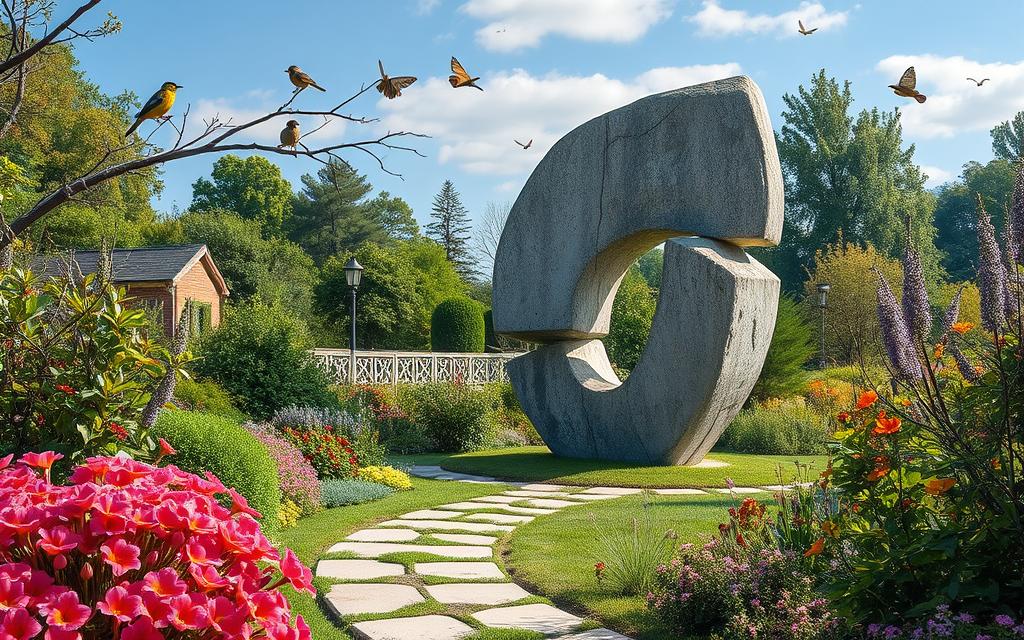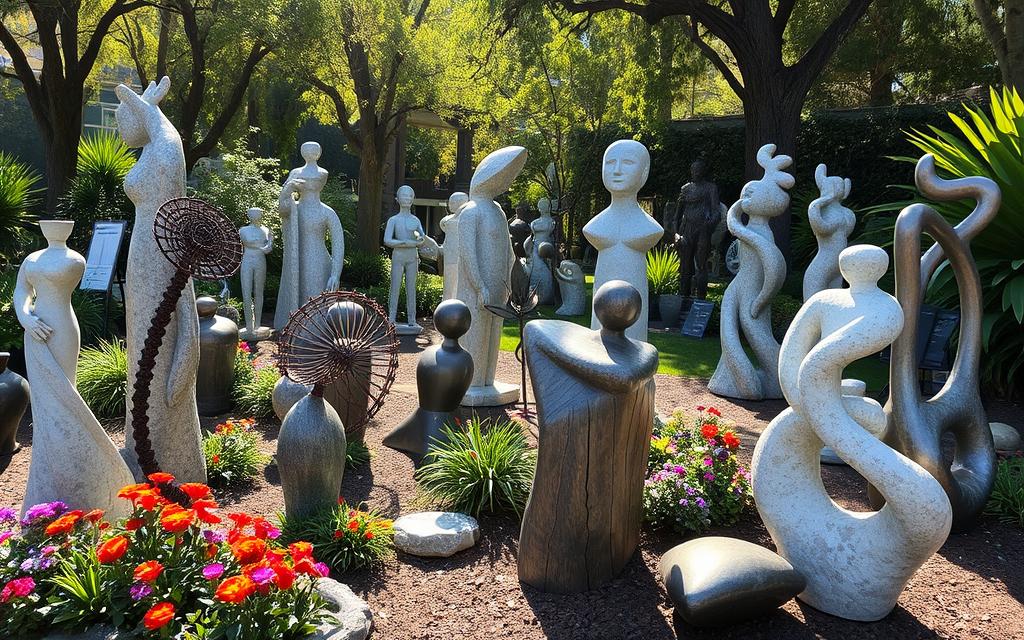Did you know starting a daily writing habit boosts your creativity? Crafting unique garden sculptures can do the same for your outdoor space. Welcome to our guide on garden sculpture, where we’ll explore creating stunning outdoor art.
In the United States, more people are enjoying the benefits of gardening. But there’s more to outdoor spaces than plants and flowers. Garden sculpture adds personality, creativity, and surprise to your landscape.
This guide is for everyone, whether you’re a seasoned gardener or new to outdoor art. You’ll learn about the importance of outdoor art and find inspiration from nature. Get ready to unleash your creativity as a garden sculptor.
Explore the Art of Garden Sculpture
Outdoor art can turn a garden into a stunning place. It adds depth, texture, and personality. Check out how garden sculptures can make your outdoor space unique and engaging.
The Significance of Outdoor Art Installations
Garden sculptures can make your outdoor area more beautiful and meaningful. They can be the main attraction, drawing your eye and encouraging you to explore. Whether it’s a big metal sculpture or a small glass piece, outdoor art can make your garden magical.
Creative Inspiration from Nature
The natural world is full of inspiration for garden sculpture. Nature’s shapes and textures can be used to create amazing outdoor art. Learn how to use nature’s beauty to make art that fits your garden’s look.
“The best works of art touch the soul, and the best garden sculptures do the same, providing a contemplative and enriching experience for the viewer.”
As you dive into garden sculpture, let nature inspire you. Use your creativity to make your outdoor space a beautiful and enchanting place.
Garden Sculpture: A Creative Outlet
Creating outdoor art projects is rewarding and fulfilling. It lets you express your style and connect with nature. Enjoy the joy and benefits of creative landscaping in your outdoor space.
One joy of garden sculpture is bringing your artistic vision to life. It’s meditative and empowering, whether you’re experienced or new. Let your imagination run wild as you create outdoor art.
Garden sculpture makes your outdoor space unique. You can turn a simple backyard into a gallery of visual delights. From whimsical to abstract, the possibilities are endless for enhancing your garden’s look.
| Outdoor Art Hotspots | Featured Sculptures | Sculpture Collections |
|---|---|---|
| Nassau County Museum of Art | Over 40 sculptures by 30 sculptors | Across 145 acres |
| Old Westbury Gardens | 35 lifelike sculptures by Seward Johnson | Displayed from June 18 to September 5 |
| LongHouse Reserve | Over 60 contemporary sculptures | On 16-acre property since 1975 |
Adding garden sculpture to your space has a unique therapeutic benefit. It promotes mindfulness, reduces stress, and deepens your connection with nature. As you create and contemplate, you may find peace and a new appreciation for nature.
Whether you display established artists or create your own DIY garden sculpture, outdoor installations can transform your garden. Unleash your artistic spirit and let your garden sculpture reflect your unique vision and love for nature.
Choosing the Perfect Materials
When picking materials for your garden sculpture, think about looks, durability, and the environment. Look into sustainable choices like recycled metals, natural stones, and renewable woods. These options will make your outdoor art last long and be kind to the planet.
Sustainable Options for Outdoor Art
Cast stone, lead, and bronze are top picks for statues. Cast stone mixes Connecticut white limestone, sand, and cement. Bronze is the most durable for garden ornamentation.
Think about where you live and the weather when picking statues. Bronze is great for more than just sundials. Cast stone works in all climates and seasons.
Exploring Different Textures and Mediums
Garden sculptures come in many materials, each with its own look and feel. You can choose from polished steel’s shine to terracotta’s earthy texture. Try out different materials to see how they change your garden’s vibe.
| Material | Characteristics | Advantages |
|---|---|---|
| Resin | Allows for intricate detailing and texture, leading to high-quality sculptures | Affordable in shipping due to their lightweight, realistic representations, availability in various sizes, and weatherproof and UV-resistant properties |
| Bronze | Robust, long-lasting, and can develop a patina over time | A traditional choice for metal garden statues |
| Copper | Produces beautiful patinas, especially in humid environments | A durable metal used for garden sculptures |
| Steel | Resilient but prone to rust if not maintained | Treating steel sculptures with linseed and turpentine oil is advised |
| Aluminum | Lightweight, durable, and made from recycled materials | A modern metal option for garden statues |
| Marble | A popular natural stone choice for sculptures but is susceptible to damage from chemicals and acids | N/A |
| Granite | Highly durable and does not dissolve with acids due to its non-porous nature | An igneous rock that is a popular choice for garden sculptures |
| Sandstone | Has a porous texture and requires cleaning with a moderate vinegar and dish soap solution | A sedimentary rock that can be used for garden sculptures |
| Cast Stone | Durable, nearly as robust as natural stone, and prone to collecting mould and grime | Made of rough concrete, and available in various styles and affordable prices |
| Concrete | Heavy and robust but can accumulate mould in damp conditions | Available in various styles and affordable prices |
“Grouped placement of statues can create dramatic effects in the garden. Pairing statues to flank a stairway or path contributes to the drama and rhythm in the garden.”
Designing Harmony: Blending Sculpture with Landscape
Adding garden sculpture to your outdoor area needs careful planning. This ensures a design that looks good together. By thinking about the size, where to put it, and how it fits with the landscape, you can make a beautiful space. It’s a mix of nature and art that looks amazing.
Begin by picking sculptures that match your garden’s look. Metal, like stainless steel, is strong and lasts long. Stone, like granite and marble, adds beauty and lasts. Wood and glass add a touch of style and are good for the planet.
Where you place the sculptures is key. Make sure they face the best direction for a great view. Adding interactive parts makes people want to touch and explore. Also, think about how light and shadow will make the sculptures look even better.
| Material | Characteristics | Benefits |
|---|---|---|
| Metal (Stainless Steel) | High strength, good durability, strong plasticity | Suitable for a wide range of garden sculptures |
| Stone (Granite, Marble) | Beautiful texture, durability, natural appearance | Ideal for commemorative sculptures |
| Wood, Glass | Rich colors, strong plasticity, environmental friendliness | Offer a decorative touch to garden art |
By carefully mixing your garden sculpture with the landscape art integration, you can make a beautiful outdoor space. It’s a place where nature and art come together. Using sculptural elements in gardens can make your garden even more special and creative.

“The integration of art and nature is the ultimate expression of the human spirit.”
Garden Sculpture: From Concept to Creation
Starting your garden sculpture journey begins with sketching and visualizing your ideas. You can brainstorm concepts, try out different forms, and use CAD software to make your vision real. This step is key to creating an outdoor art installation that shows off your unique style.
Sketch and Visualize Your Ideas
Begin by sketching your ideas and playing with shapes and sizes. It’s okay to try many approaches – the garden sculpture design process is all about exploring. Use CAD software to see how your sculpture will fit in the garden.
Hands-on Techniques for Sculpting
Making your garden sculpture involves many hands-on techniques and skills. You’ll learn how to shape materials and add finishing touches. Discover the steps for sculpting with clay, metal, stone, or other materials. Learn to make your outdoor art and DIY outdoor art come to life.
Develop your sculptural skills and turn your garden into a lively, artistic space. Embrace the garden sculpture journey and let your creativity flourish.
“I find creating nature art to be calming and a unique form of artistic expression compared to traditional mediums like paint or markers.”
– Eden Overland, 10-year-old nature artist
Conclusion
Exploring garden sculpture is a fun way to make your outdoor area special. It lets you show off your creativity. By looking at outdoor art and nature, you can turn your garden into a masterpiece that shows who you are.
This guide has given you the tools to start your own sculpture project. You can pick from many styles, like modern or classic. Garden sculptures can make your outdoor space beautiful and unique, matching your taste.
Keep exploring garden sculpture and enjoy the creative journey. It’s not just about making your garden look good. It’s about expressing yourself and making your outdoor space special. Let your creativity shine and make your garden a beautiful place of peace and happiness.
FAQ
What are the benefits of incorporating garden sculpture into my outdoor space?
Garden sculptures can change your outdoor area. They add depth, texture, and personality. Your garden becomes a unique and engaging place.
How can I find inspiration for my garden sculpture?
The natural world is full of inspiration. Look at the curves of water and the angles of rocks. Use these to create stunning outdoor art that fits your garden’s look.
What materials are best for outdoor garden sculptures?
Choose materials that look good and last long. Think about sustainable options like recycled metals, natural stones, and renewable woods. They’re good for the planet and your sculpture will last.
How do I integrate garden sculpture into my landscape design?
Integrating sculpture into your space needs thought. Think about the sculpture’s size, where to put it, and how it fits with the landscape. Find ways to mix your sculpture with the natural features for a beautiful outdoor space.
What are the steps involved in creating a garden sculpture?
Making a garden sculpture involves many steps. You’ll shape materials and add finishing touches. Learn how to sculpt with clay, metal, stone, or other materials. Turn your idea into a real outdoor sculpture.
Source Links
- Unlock Your Potential: The Ultimate Guide to Creative Writing, Minimalism, Public Speaking, Traveling, and Gardening
- Unlock Your Green Thumb Potential: Transform Your Garden with Expert Techniques and Creative Tips: Ignite Your Passion for Gardening Today! : .H Morrow, Trinity: Amazon.sg: Books
- Sculpture Garden Tour
- Exploring the Minneapolis Sculpture Garden
- Artists and Their Gardens: Beauty, Creativity, Sanctuary
- Art Outdoors: Must-See Sculpture Gardens and Alfresco Art on Long Island
- Art in the Garden — Beautiful Minds
- 5 Tips for Selecting Garden Statuary
- A Guide to Different Materials for Garden Statues: Add Interest and Character to Your Landscape – GardenAdvice.co.uk
- Garden Sculpture: Exploring the harmony between art and garden
- Incorporating Art and Sculpture in Your Garden Design – Redcliffe Landscape Gardeners
- The Art of Landscape Architecture: Blending Aesthetics With Functionality
- Noguchi’s Vision for The Isamu Noguchi Garden Museum – The Noguchi Museum
- The Art of Creation: A Different Way of Doing Art
- How to Set Up Your Modern Garden Statues
- Marble Sculptures as Garden Focal Points
- How to Make Modern Garden Statues – YouFine







